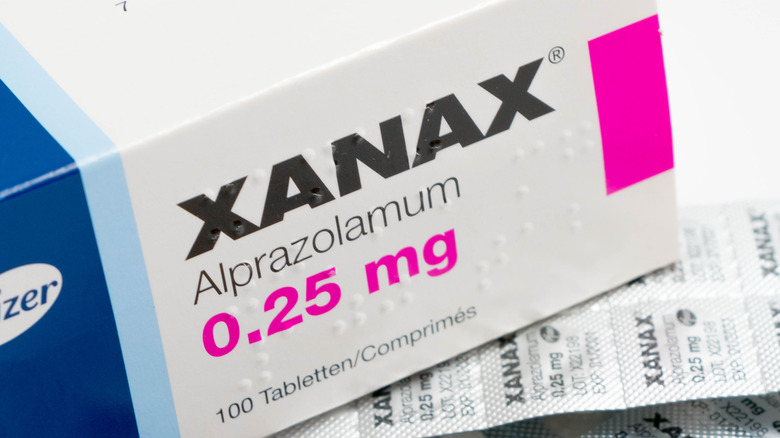What To Consider Before Taking Xanax (And Other Fast-Acting Anxiety Medications)
In today's fast-paced world, the number of people experiencing anxiety and stress-related disorders is rising. According to Newsweek, during the peak of the pandemic in 2020, the consumption of anti-anxiety pharmaceuticals increased by more than 34%. This significant increase can be attributed to Americans' enormous stress due to job loss, sickness, and general fear about the future.
For some, Xanax (alprazolam) and other benzodiazepines can offer much-needed relief in the face of overwhelming stress. However, there are some critical aspects to consider before taking Xanax and other fast-acting anxiety medications to ensure you make an informed decision for your mental health and overall well-being.
While these medications can temporarily relieve anxiety, it is crucial to weigh the pros and cons before starting a course of treatment. By arming yourself with knowledge, you can decide whether Xanax or other fast-acting anxiety medications are the right choices for you before incorporating them into your treatment plan (via HelpGuide).
What is Xanax?
Xanax, frequently prescribed under the generic alprazolam, is a benzodiazepine prescription drug. Xanax is considered a Schedule IV controlled substance due to the potential for misuse (via the United States Drug Enforcement Administration). Because it is part of the benzodiazepine family, it works by causing central nervous system depression and functions by boosting the effects of gamma-aminobutyric acid (GABA). This neurotransmitter reduces nerve cell activity, resulting in a heightened sensation of relaxation and calmness. Xanax primarily treats anxiety disorders, panic attacks, and short-term anxiety symptoms (per StatPearls).
The safety of Xanax has been a topic of concern because of the possibility of overuse, addiction, and reliance. The Food and Drug Administration (FDA) revised the boxed warning for benzodiazepines, including Xanax, in 2020 to accurately portray these risks. The updated notice stresses the dangers of physical reliance and withdrawal symptoms, which can occur even when the medication is taken exactly as prescribed. Seizures, psychosis, and other severe withdrawal symptoms can occur if Xanax is stopped abruptly. For these reasons, it is critical that healthcare providers carefully review the patient's history and weigh the risks and benefits for each patient.
If you or anyone you know needs help with addiction issues, help is available. Visit the Substance Abuse and Mental Health Services Administration website or contact SAMHSA's National Helpline at 1-800-662-HELP (4357).
Understanding anxiety
Anxiety is a normal emotion that people feel when confronted with difficult or stressful situations. However, when anxiety becomes a regular occurrence, it can interfere with daily tasks and negatively impact overall well-being. When this happens, an anxiety disorder may be the reason. According to the Mayo Clinic, anxiety disorders are a group of mental health conditions that involve excessive and irrational fear or worry. These disorders can range from generalized anxiety disorder (GAD) to specific phobias, panic disorder, and social anxiety disorder.
Anxiety symptoms vary depending on the type of disorder and the individual, but common symptoms include uneasiness or nervousness, difficulty concentrating, irritability, muscle tension, and sleep disturbances. Physical symptoms such as sweating, trembling, and rapid heartbeat may also be present. For those with severe anxiety, panic attacks can occur. These sudden and intense periods of fear or panic can cause physical symptoms like chest pain, shortness of breath, and dizziness (via the American Psychological Association).
Because anxiety disorders have the potential to significantly impact daily life, causing difficulties with work or school, relationships, and social activities, it is essential to speak to your healthcare provider for treatment options and support to help manage symptoms and improve quality of life.
Be sure to provide a thorough medical history
While fast-acting anxiety drugs like Xanax can provide immediate relief from anxiety symptoms, they can also have significant adverse effects and interact with other prescriptions or health issues. This is why your comprehensive medical history should be shared with your healthcare provider, including any existing medical problems, surgical history, hospitalizations, medication use, and over-the-counter medications or supplements. Providing any existing history of drug or alcohol misuse is equally important, as Xanax and other benzodiazepines can be habit-forming (via Mayo Clinic).
Additionally, your healthcare provider should also consider your age, as older adults may be more susceptible to the sedative effects of benzodiazepines, which can increase the risk of falls and cognitive impairment (via U.S Health and Human Services). Furthermore, individuals with certain medical conditions, such as liver or kidney disease, and respiratory issues, may also need to exercise caution when considering Xanax or other anxiety medications. In some cases, alternative treatments or adjusted dosages may be more appropriate to minimize potential risks (via WebMD).
By sharing your medical history and working with your healthcare provider, you can make informed decisions about your anxiety treatment and improve your overall well-being.
Understanding Xanax dosage and potential side effects
Xanax dosages vary depending on the severity of your anxiety, age, and any pre-existing health conditions. Generally, the initial dose for treating anxiety disorders is 0.25 to 0.5 milligrams, taken three times a day. Still, your healthcare provider may adjust the dosage based on your response and tolerance. It is essential to follow your doctor's recommendations and avoid self-adjusting your dosage, as this can lead to increased side effects or dependence on the medication (per the Mayo Clinic).
As with any medication, Xanax comes with the possibility of side effects. Common side effects may include drowsiness, dizziness, lightheadedness, fatigue, and impaired coordination. While these side effects are generally mild and may lessen over time, monitoring your response to the medication and reporting any concerns to your healthcare provider is essential (via Medical News Today). More severe side effects rarely occur, but can happen. These include memory problems, mood changes, hallucinations, trouble speaking, yellowing of the eyes or skin (jaundice), and seizures. If you experience severe side effects, seek immediate medical attention.
It's crucial to know the potential side effects and take Xanax exactly as prescribed to minimize risks. By working with your healthcare provider and monitoring your response to the medication, you can ensure a safe and effective anxiety treatment experience.
Potential for dependency and addiction
Xanax has a high potential for dependency and addiction, prompting patients and healthcare practitioners to exercise caution. A study published in the Journal of Addiction Medicine states that even though Xanax is considered to be addictive, it is the most commonly prescribed rapid-acting anxiety medication. In addition to concerns about addiction, long-term use of Xanax can also lead to tolerance, in which users require greater doses to attain the same therapeutic effects. Because their bodies adjust to the presence of the drug, they are more likely to develop dependence requiring more significant amounts. As a result, discontinuing Xanax use might cause withdrawal symptoms, triggering people to continue taking the prescription to avoid discomfort (via the Recovery Village).
Additionally, individuals who rely on Xanax to treat their anxiety may develop a psychological reliance, believing they cannot function without the prescription. This notion can reinforce addictive behavior, making it difficult to stop using (per the American Addiction Centers). Finally, when Xanax is mixed with other substances (such as alcohol), the risk of dependency and addiction increases. These combinations increase the likelihood of addiction and have fatal implications, such as respiratory depression, increased risk from accidents or falls, and possible overdose (per GoodRx).
Effects of Xanax on sexual health and intimacy
Xanax may affect all elements of a person's life, including their sexual life. For starters, Xanax may reduce sexual desire or libido. Benzodiazepines such as Xanax slow down the central nervous system, impacting the neurotransmitters responsible for nerve cell activity and boosting relaxation and anxiety. However, this relaxing impact may mistakenly reduce sexual desire by suppressing excitatory neurotransmitters that lead to arousal (via Healthline).
Another possible effect of Xanax on a person's sexual life, as mentioned in a study published in BJ Psych Open, is the development of erectile dysfunction in males and anorgasmia in women. Benzodiazepines' sedative characteristics can interfere with the physiological processes involved in obtaining and sustaining an erection or orgasm. In certain situations, this can result in a diminished ability to perform sexually, adding to the tension and anxiety.
Xanax can impair cognitive and motor abilities, potentially affecting an individual's ability to engage in sexual activities. The sedative effects of the medicine may cause sleepiness, dizziness, or impaired coordination, damaging one's ability to engage in intimacy or raising the risk of harm during sexual relations (via Focus Psychiatry).
Alternative treatments to consider
Alternative treatments for anxiety management can offer various options for people seeking non-pharmacological approaches or complementary methods. One such method is cognitive behavioral therapy, a well-established psychological intervention that addresses maladaptive thinking patterns and behaviors. It has proven effective in treating anxiety disorders by teaching individuals to identify, challenge, and replace negative thoughts with more balanced, rational ones (via Focus Psychiatry Online).
Another option is acupuncture, an ancient Chinese medical practice that involves inserting thin needles into specific points on the body to balance energy flow. Acupuncture can be a helpful adjunct treatment for anxiety by regulating the nervous system and reducing stress. Many people report feeling calmer within a few minutes after starting treatment (via Medical News Today).
Furthermore, herbal and nutritional supplements, such as valerian root, passionflower, kava, and St. John's wort, may also relieve anxiety for some individuals. However, consulting with a healthcare professional before starting any supplement regimen is essential, as they can interact with other medications, including Xanax (via St. Luke's Hospital).
Lastly, Psych Central mentions biofeedback as a valuable non-invasive option that teaches individuals to control their physiological responses, such as heart rate, breathing, and muscle tension. Individuals can develop skills to reduce anxiety and stress by learning to manage these responses. Essentially, there are many alternative choices, but not all are suitable for everyone. It may be a trial-and-error approach to determine what is best for your situation.
Identifying contraindications for safe treatment
Xanax can benefit many patients, but it is crucial to consider specific contraindications before taking it. To begin with, Mayo Clinic reports that individuals with a known allergy to alprazolam or other benzodiazepines should avoid Xanax due to the risk of an allergic reaction, which can manifest as difficulty breathing, hives, and swelling of the face, lips, tongue, or throat. Furthermore, if you are taking any medications, be sure to report those to your healthcare provider, as multiple drugs may adversely interact with Xanax.
In addition to these concerns, pregnant and breastfeeding women should avoid Xanax. Since it has been classified as a Category D drug by the FDA, it has the potential to cause harm to the developing fetus or newborn, especially in the last trimester. Some risks include withdrawal symptoms, feeding issues, agitation, and impaired neurological development (via StatPearls).
Lastly, patients with a liver or kidney disease history should exercise caution when taking Xanax. These conditions can affect the drug's metabolism and elimination, potentially leading to an increased risk of side effects. Similarly, individuals with a history of respiratory disorders (such as asthma or chronic obstructive pulmonary disease) should be cautious, as Xanax may depress respiratory function and exacerbate breathing difficulties (per Drugs.com). Numerous health conditions may contraindicate the use of fast-acting anxiety medications. Consult your healthcare provider to determine your safest option.
Mental health support
Anxiety is a widespread mental health problem that affects millions of people worldwide. As individuals struggle with anxiety, providing appropriate mental health support is essential to help them navigate these challenges and improve their overall well-being.
One effective strategy for managing anxiety is incorporating therapy or counseling sessions. Finding a mental health professional experienced in treating anxiety disorders is crucial to ensure the most effective support and treatment customized to the patient's needs. The American Psychological Association states that most patients report improvement in anxiety symptoms after a few therapy sessions.
In addition to therapy, individuals with anxiety can benefit from incorporating self-help strategies into their daily routines. According to the National Alliance on Mental Illness, identifying triggers can help control stress, especially if you allow for the opportunity to pause and relax before facing an event you realize will cause anxiety. Finally, support from family and friends is essential to overall well-being.
If you or someone you know needs help with mental health, please contact the Crisis Text Line by texting HOME to 741741, call the National Alliance on Mental Illness helpline at 1-800-950-NAMI (6264), or visit the National Institute of Mental Health website.
What to know about exercise, anxiety, and Xanax
Exercise has long been recognized as a safe and effective approach to alleviating anxiety symptoms. Regular physical activity can aid in releasing endorphins, the body's natural feel-good chemicals, which can induce relaxation and lower anxiety levels. Exercise can also help with sleep quality and self-esteem and distracts from nervous thoughts (via Help Guide). Additionally, exercise may help relieve the physical symptoms the body can experience from anxiety or stress. These may include muscle tension, headaches, or back pain.
With that said, certain precautions or warnings should be followed if Xanax or other fast-acting anxiety drugs are recommended and taken before exercising. Xanax can make you tired and impair your coordination, lowering your energy levels, which could jeopardize your safety; furthermore, taking supplements and planning to exercise while on Xanax should be avoided, since they can interact with the medicine and pose safety issues (via SingleCare).
Is it safe to take Xanax to help with sleep?
While Xanax may be effective for treating anxiety and panic, it is not recommended as a sleep aid. Using Xanax regularly as a sleep aid can lead to several potential health risks. One of the most significant risks associated with regular Xanax use is the development of dependence or addiction, as it is a highly addictive medication that can cause physical dependence with long-term use (via Serenity at Summit). Moreover, it can lead to rebound insomnia, where the symptoms worsen once the drug is discontinued.
In addition to its intended effects, prolonged use of Xanax for sleep can lead to various adverse effects, including daytime sleepiness, dizziness, confusion, and impaired coordination. These side effects can make it challenging to carry out everyday activities. Lastly, a study published in the American Journal of Medicine discovered that taking Xanax before bed can worsen sleep apnea or snoring if present in the individual.












